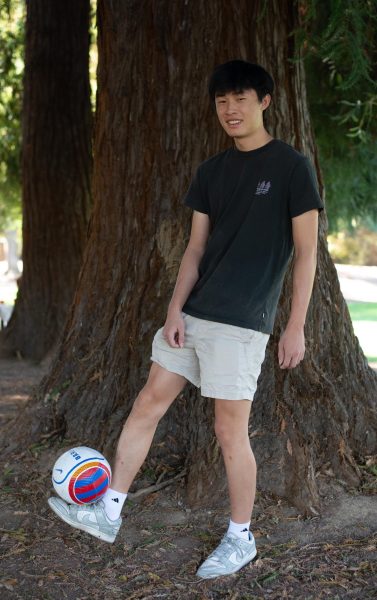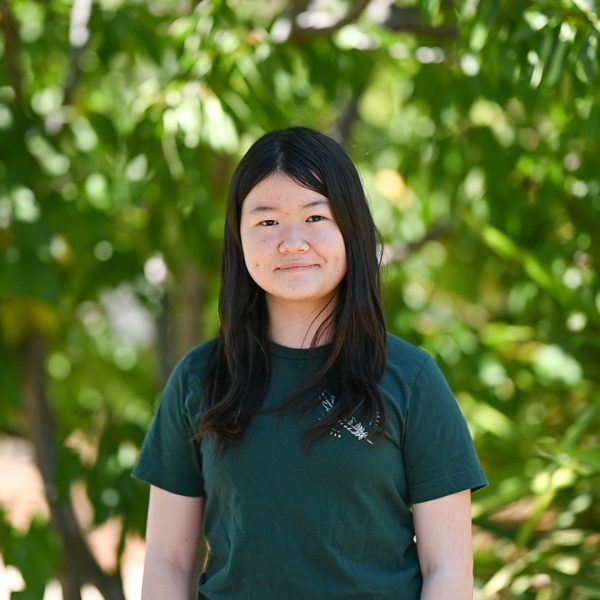
What defines real-world impact?
To some, it may be inventing a new product or addressing global issues, such as climate change. Perhaps it’s enforcing equality or revolutionizing scientific discovery.
To senior Jonathan Wang, real-world impact is characterized by community involvement, from which he achieves through volunteering and economics.
“Real-world impact is definitely something I’ve been making since frosh year, something that’s been a big part of my high school experience,” Jonathan said. “Having that bond with people I wouldn’t usually interact with is really meaningful to me.”
Jonathan volunteers at Friends of Children with Special Needs (FCSN), a nonprofit organization whose mission is to empower children with special needs by fostering love and respect through mentorship activities involving music, dance and crafts. In his junior year, Jonathan cofounded the FCSN club and enjoys his interactions with his autistic mentee Ethan during club meetings when they play fun games and create art.
“Every single meeting I have with Ethan, I’m always laughing or I always learn something new about his life, my life or something in general,” Jonathan said. “FCSN definitely taught me to be more understanding and how no matter who I’m talking to, they always have something valuable to say. It’s about hearing everybody out and giving everybody a chance to speak.”
The ability to connect with diverse perspectives through FCSN naturally influenced Jonathan’s interest in economics, in which he is tasked to understand different viewpoints to solve societal issues. His affinity for economics originally blossomed in seventh grade after a one-week summer camp and later taking AP Economics in junior year. After thoroughly enjoying the course, he participated in the National Economics Challenge with his team, a competition that was strongly promoted in class.
“Economics has potential to be really big through community involvement within economics education,” Jonathan said. “I can really make a difference in under-represented or marginalized communities by researching or providing numerical solutions in otherwise abstract issues, like discrimination, income inequality, access to education, public health and much more.”
A particular economics topic Jonathan is interested in is risk aversion, which he discovered while studying for the National Economics Challenge. He views this as an example of how economic ideas influence the decisions people make.
“Risk aversion is really cool to see in my daily life being applied in so many situations,” Jonathan said. “For example, in insurance, I was taught that we really couldn’t survive if humans were very neutral. Seeing that such an abstract concept would be linked to real-world applicability and being the basis of how economic systems improve is interesting.”
Jonathan’s interest for understanding complex ideas and their practical implications is one of the qualities that stands out to his close friend senior Ethan Wang. Having met Jonathan in sixth grade, Ethan constantly finds inspiration in Jonathan’s unwavering work ethic.
“He’s the most hardworking out of everyone I know,” Ethan said. “He’s always talking about ‘I have to do work.’ Even though we’re doing the same things, like college applications, he’s always on top of it. I see him doing a lot of work and it inspires me to achieve that level of mindless working.”
Close friend senior Caleb Tang met Jonathan in sixth grade when he welcomed Jonathan to Harker as his buddy. Caleb notes Jonathan’s infectious personality from working together in many academic competitions including DECA and the National Economics Challenge.
“He’s really funny, down to earth and a great guy to be around,” Caleb said. “I admire that he’s always open and very engaging. When we’re together, we can build off of each other because we’re both unserious people. He approaches things with humor, which I think is a breath of fresh air.”
Although Jonathan’s friends appreciate the lighthearted side of his personality, English teacher Tia Barth, who taught Jonathan in his junior year, commends the more serious and dedicated side of him. She reflects particularly on Jonathan’s resilience and determination to always perform his best on essays.
“Jonathan was always really receptive and it’s that humility combined with curiosity and love of learning that makes him unique,” Barth said. “He might turn in an assignment that was an A and there would be an optional rewrite he would always do. I never got the sense that he was trying to get the A+ so much, rather he would come and talk to me to raise his writing up to the next level.”
Having been at Harker since sixth grade, Jonathan is used to the stressful environment, which he takes advantage of to grow in his learning of economics and community volunteering. Jonathan’s inherent desire to do well is driven by the impact his environment has left upon him.
“Everyone knows that Harker is super competitive,” Jonathan said. “That immediately helped me become a more competitive person. Competition is not always a good thing but I always try to be the better version of myself, by being competitive with my past self and my future self. I want to say that I changed for the better, not that I remained stagnant.”


















![“[Building nerf blasters] became this outlet of creativity for me that hasn't been matched by anything else. The process [of] making a build complete to your desire is such a painstakingly difficult process, but I've had to learn from [the skills needed from] soldering to proper painting. There's so many different options for everything, if you think about it, it exists. The best part is [that] if it doesn't exist, you can build it yourself," Ishaan Parate said.](https://harkeraquila.com/wp-content/uploads/2022/08/DSC_8149-900x604.jpg)




![“When I came into high school, I was ready to be a follower. But DECA was a game changer for me. It helped me overcome my fear of public speaking, and it's played such a major role in who I've become today. To be able to successfully lead a chapter of 150 students, an officer team and be one of the upperclassmen I once really admired is something I'm [really] proud of,” Anvitha Tummala ('21) said.](https://harkeraquila.com/wp-content/uploads/2021/07/Screen-Shot-2021-07-25-at-9.50.05-AM-900x594.png)







![“I think getting up in the morning and having a sense of purpose [is exciting]. I think without a certain amount of drive, life is kind of obsolete and mundane, and I think having that every single day is what makes each day unique and kind of makes life exciting,” Neymika Jain (12) said.](https://harkeraquila.com/wp-content/uploads/2017/06/Screen-Shot-2017-06-03-at-4.54.16-PM.png)








![“My slogan is ‘slow feet, don’t eat, and I’m hungry.’ You need to run fast to get where you are–you aren't going to get those championships if you aren't fast,” Angel Cervantes (12) said. “I want to do well in school on my tests and in track and win championships for my team. I live by that, [and] I can do that anywhere: in the classroom or on the field.”](https://harkeraquila.com/wp-content/uploads/2018/06/DSC5146-900x601.jpg)
![“[Volleyball has] taught me how to fall correctly, and another thing it taught is that you don’t have to be the best at something to be good at it. If you just hit the ball in a smart way, then it still scores points and you’re good at it. You could be a background player and still make a much bigger impact on the team than you would think,” Anya Gert (’20) said.](https://harkeraquila.com/wp-content/uploads/2020/06/AnnaGert_JinTuan_HoHPhotoEdited-600x900.jpeg)

![“I'm not nearly there yet, but [my confidence has] definitely been getting better since I was pretty shy and timid coming into Harker my freshman year. I know that there's a lot of people that are really confident in what they do, and I really admire them. Everyone's so driven and that has really pushed me to kind of try to find my own place in high school and be more confident,” Alyssa Huang (’20) said.](https://harkeraquila.com/wp-content/uploads/2020/06/AlyssaHuang_EmilyChen_HoHPhoto-900x749.jpeg)



